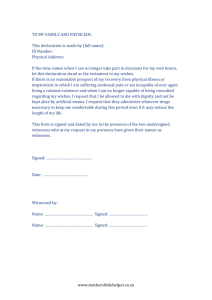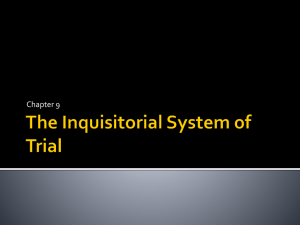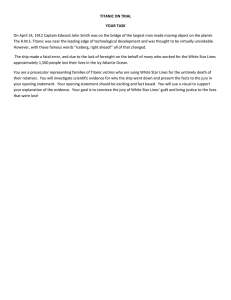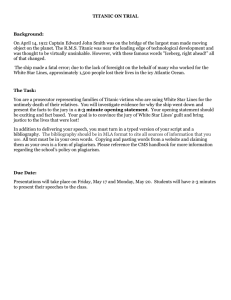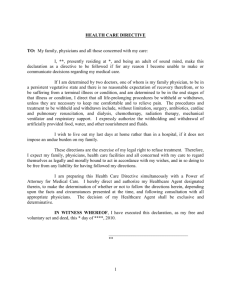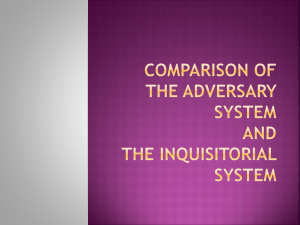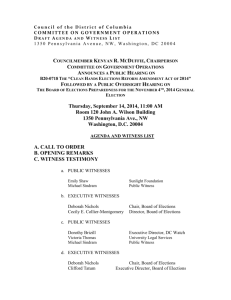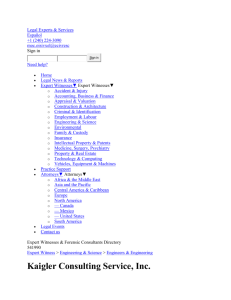Trial Preparation Call to order. Opening Statements: Accuser; Defender.
advertisement
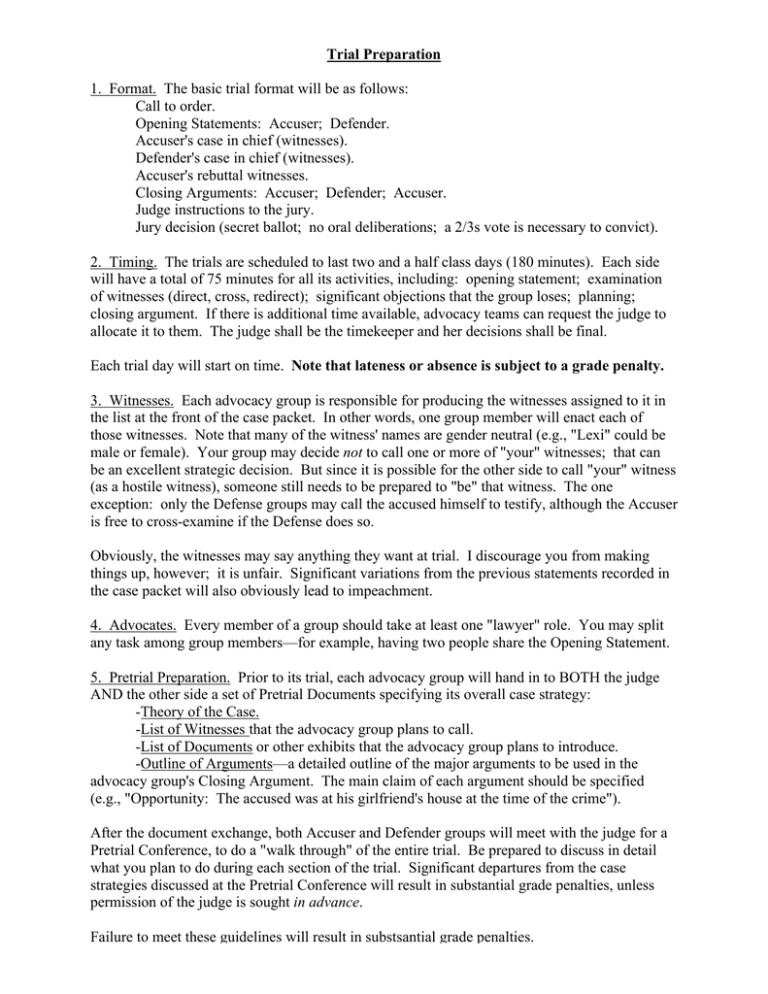
Trial Preparation 1. Format. The basic trial format will be as follows: Call to order. Opening Statements: Accuser; Defender. Accuser's case in chief (witnesses). Defender's case in chief (witnesses). Accuser's rebuttal witnesses. Closing Arguments: Accuser; Defender; Accuser. Judge instructions to the jury. Jury decision (secret ballot; no oral deliberations; a 2/3s vote is necessary to convict). 2. Timing. The trials are scheduled to last two and a half class days (180 minutes). Each side will have a total of 75 minutes for all its activities, including: opening statement; examination of witnesses (direct, cross, redirect); significant objections that the group loses; planning; closing argument. If there is additional time available, advocacy teams can request the judge to allocate it to them. The judge shall be the timekeeper and her decisions shall be final. Each trial day will start on time. Note that lateness or absence is subject to a grade penalty. 3. Witnesses. Each advocacy group is responsible for producing the witnesses assigned to it in the list at the front of the case packet. In other words, one group member will enact each of those witnesses. Note that many of the witness' names are gender neutral (e.g., "Lexi" could be male or female). Your group may decide not to call one or more of "your" witnesses; that can be an excellent strategic decision. But since it is possible for the other side to call "your" witness (as a hostile witness), someone still needs to be prepared to "be" that witness. The one exception: only the Defense groups may call the accused himself to testify, although the Accuser is free to cross-examine if the Defense does so. Obviously, the witnesses may say anything they want at trial. I discourage you from making things up, however; it is unfair. Significant variations from the previous statements recorded in the case packet will also obviously lead to impeachment. 4. Advocates. Every member of a group should take at least one "lawyer" role. You may split any task among group members—for example, having two people share the Opening Statement. 5. Pretrial Preparation. Prior to its trial, each advocacy group will hand in to BOTH the judge AND the other side a set of Pretrial Documents specifying its overall case strategy: -Theory of the Case. -List of Witnesses that the advocacy group plans to call. -List of Documents or other exhibits that the advocacy group plans to introduce. -Outline of Arguments—a detailed outline of the major arguments to be used in the advocacy group's Closing Argument. The main claim of each argument should be specified (e.g., "Opportunity: The accused was at his girlfriend's house at the time of the crime"). After the document exchange, both Accuser and Defender groups will meet with the judge for a Pretrial Conference, to do a "walk through" of the entire trial. Be prepared to discuss in detail what you plan to do during each section of the trial. Significant departures from the case strategies discussed at the Pretrial Conference will result in substantial grade penalties, unless permission of the judge is sought in advance. Failure to meet these guidelines will result in substsantial grade penalties. 6. Objections. Objections are possible, but discouraged unless the objectionable conduct is likely to significantly ("materially") affect the trial's outcome. In other words, don't sweat the small stuff. As noted above, the team losing the objection will "pay" for it out of its time. A list of court rules will be passed out prior to trial; they'll include things like the rule against argument in opening statements; the rule against vouching; the rule requiring all statements to be based on evidence; and various rules involved in questioning witnesses. 7. Assessment. Good trial advocacy demonstrates: 1. A good, consistent theory of the case (see standards). 2. Good storytelling (see standards). 3. Good questioning (see standards). 4. Good arguing (see standards). 5. Ethical behavior as advocates, including: -Not being complicit in perjury. -Showing basic fairness to the opposing side. -Showing respect for everyone in the courtroom. 6. A strong group spirit, including: -Shared responsibilities—everyone taking a significant role that best uses their personal strengths. -Coordinated responsibilities—everyone "on the same page." -A strong ethos: professional and fun. 7. Dealing well with the unexpected. 8. Extra credit. Any individual or group who believes or learns that their group has made a mistake in trial planning or performance that would affect the group's grade may submit an analysis of the mistake for extra credit. The analysis should include: a description of the mistake and a detailed discussion of what would have been the better thing to do. For example, if there was a mistake in the way the Opening Statement was constructed, the analysis should identify the exact problem, explain why it was a problem, and then construct a new Opening that would avoid the problem. The extra credit analysis should be submitted to me by email no later than 48 hours after the mistake occurred. Trial Delaney Wyatt Accuser Defender Group Group Pretrial Documents due (in class) 28 Mar (11 T) 6 Apl (12 R) Pretrial Conference (in class) 30 Mar (11 R) 11 Apl (13 T) Trial Begins 4 Apl (12 T) 13 Apl (13 R)
